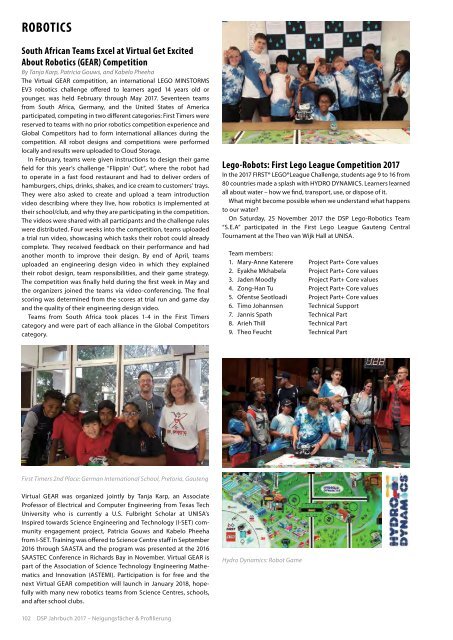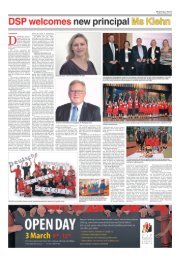DSP Jahrbuch 2017/ DSP Yearbook 2017
Browse through an eventful 2017 with our current yearbook!
Browse through an eventful 2017 with our current yearbook!
Erfolgreiche ePaper selbst erstellen
Machen Sie aus Ihren PDF Publikationen ein blätterbares Flipbook mit unserer einzigartigen Google optimierten e-Paper Software.
ROBOTICS<br />
South African Teams Excel at Virtual Get Excited<br />
About Robotics (GEAR) Competition<br />
By Tanja Karp, Patricia Gouws, and Kabelo Pheeha<br />
The Virtual GEAR competition, an international LEGO MINSTORMS<br />
EV3 robotics challenge offered to learners aged 14 years old or<br />
younger, was held February through May <strong>2017</strong>. Seventeen teams<br />
from South Africa, Germany, and the United States of America<br />
participated, competing in two different categories: First Timers were<br />
reserved to teams with no prior robotics competition experience and<br />
Global Competitors had to form international alliances during the<br />
competition. All robot designs and compe ti tions were performed<br />
locally and results were uploaded to Cloud Storage.<br />
In February, teams were given instructions to design their game<br />
field for this year’s challenge “Flippin’ Out”, where the robot had<br />
to operate in a fast food restaurant and had to deliver orders of<br />
hamburgers, chips, drinks, shakes, and ice cream to customers’ trays.<br />
They were also asked to create and upload a team introduction<br />
video describing where they live, how robotics is implemented at<br />
their school/club, and why they are participating in the competition.<br />
The videos were shared with all participants and the challenge rules<br />
were distributed. Four weeks into the competition, teams uploaded<br />
a trial run video, showcasing which tasks their robot could already<br />
complete. They received feedback on their performance and had<br />
another month to improve their design. By end of April, teams<br />
up loaded an engineering design video in which they explained<br />
their robot design, team responsibilities, and their game strategy.<br />
The competition was finally held during the first week in May and<br />
the organizers joined the teams via video-conferencing. The final<br />
scoring was determined from the scores at trial run and game day<br />
and the quality of their engineering design video.<br />
Teams from South Africa took places 1-4 in the First Timers<br />
category and were part of each alliance in the Global Competitors<br />
category.<br />
Lego-Robots: First Lego League Competition <strong>2017</strong><br />
In the <strong>2017</strong> FIRST® LEGO®League Challenge, students age 9 to 16 from<br />
80 countries made a splash with HYDRO DYNAMICS. Learners learned<br />
all about water – how we find, transport, use, or dispose of it.<br />
What might become possible when we understand what happens<br />
to our water?<br />
On Saturday, 25 November <strong>2017</strong> the <strong>DSP</strong> Lego-Robotics Team<br />
“S.E.A” participated in the First Lego League Gauteng Central<br />
Tournament at the Theo van Wijk Hall at UNISA.<br />
Team members:<br />
1. Mary-Anne Katerere Project Part+ Core values<br />
2. Eyakhe Mkhabela Project Part+ Core values<br />
3. Jaden Moodly Project Part+ Core values<br />
4. Zong-Han Tu Project Part+ Core values<br />
5. Ofentse Seotloadi Project Part+ Core values<br />
6. Timo Johannsen Technical Support<br />
7. Jannis Spath Technical Part<br />
8. Arieh Thill Technical Part<br />
9. Theo Feucht Technical Part<br />
First Timers 2nd Place: German International School, Pretoria, Gauteng<br />
Virtual GEAR was organized jointly by Tanja Karp, an Associate<br />
Professor of Electrical and Computer Engineering from Texas Tech<br />
University who is currently a U.S. Fulbright Scholar at UNISA’s<br />
Inspired towards Science Engineering and Technology (I-SET) community<br />
engagement project, Patricia Gouws and Kabelo Pheeha<br />
from I-SET. Training was offered to Science Centre staff in September<br />
2016 through SAASTA and the program was presented at the 2016<br />
SAASTEC Conference in Richards Bay in November. Virtual GEAR is<br />
part of the Association of Science Technology Engineering Mathematics<br />
and Innovation (ASTEMI). Participation is for free and the<br />
next Virtual GEAR competition will launch in January 2018, hopefully<br />
with many new robotics teams from Science Centres, schools,<br />
and after school clubs.<br />
Hydro Dynamics: Robot Game<br />
102 <strong>DSP</strong> <strong>Jahrbuch</strong> <strong>2017</strong> – Neigungsfächer & Profilierung



